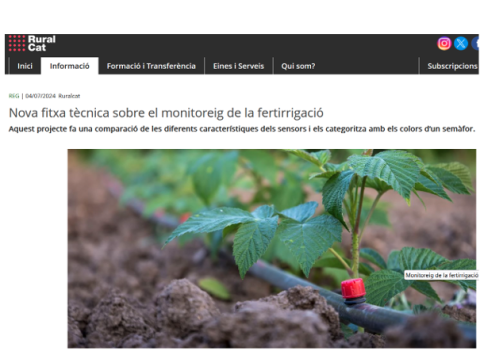Bridging rural communities through digitalisation

It has been another scorching day, and Maria gazes over her hectare of land. The vegetables she grows as a market gardener are withering under the relentless Catalonian sun. With water supplies running dangerously low, she's running out of ideas. In her search for solutions, she turns to RuralCat, a resource spotlighted in the Interreg Europe project ORIGINN.
RuralCat is a vital resource for rural development, offering extensive information on projects, activities, training and funding guidance. It facilitates collaboration among farmers, the agrifood industry, universities, and research centres through interactive tools and online services. By providing educational resources and training modules, RuralCat promotes sustainable agricultural practices and environmental management.
With over 70,000 registered users and strong social media engagement, RuralCat has significantly increased the engagement of Catalonia’s agricultural community in training sessions, e-learning modules, and knowledge-sharing activities, thereby promoting technological advancements and sustainable practices within the sector.
Thanks to RuralCat, Maria discovers new techniques for soil conservation and water management. With access to funding opportunities and support programmes of the platform, Maria transforms her truck farming into a model of sustainable agriculture. She regularly engages with experts and professionals via their interactive tools, enhancing her knowledge and network.

On the same day, at the same time, in the countryside of Jämtland-Härjedalen, Sweden, Johan faces a bitter reality. His photovoltaic equipment company is struggling, hampered by a lack of connections and the isolation that stifles his business growth. In search of solutions, Johan turns to the internet and discovers DELBART.

It hosts 50-minute digital meetings four times a year, where various entrepreneurs and organisations share insights, success stories and failures, and lessons related to their businesses and digitalisation. Each meeting features 3-4 local speakers, ensuring the content is relevant and relatable to local entrepreneurs and business owners.
Attendees can ask questions, connect, and engage through the chat, fostering a sense of community and collaboration despite physical distances. Coordinated by the Region of Jämtland-Härjedalen and designed for SMEs, DELBART emphasises bottom-up networking and knowledge sharing among local entrepreneurs and companies.
Johan starts participating in digital meetings, gaining valuable insights from peers and experts. The platform's interactive chat allows him to ask questions and share his experiences, fostering a supportive dialogue. By attending these sessions, Johan learns new strategies that boost his business's efficiency and reach. Through DELBART, he connects with a network of like-minded individuals, finding the collaboration and support he needs to overcome his challenges and drive his company towards growth and success.
These two platforms show how local communities and users in rural areas can largely benefit from digital platforms. Both RuralCat and DELBART emphasise the value of collaboration, whether through connecting farmers with experts or involving local entrepreneurs in knowledge sharing. These initiatives highlight the transformative power of digitalisation in bridging rural communities, fostering innovation, and driving sustainable development across Europe.
Both good practices are identified in the context of the Interreg Europe project ORIGINN, dedicated to economic and social transformation in rural areas. Several other Interreg Europe projects focus on digitalisation as a tool to foster development in rural areas, such as DigitalRural or INSPIRE.
More broadly, the European Union’s rural development policy aims to help rural regions grow and improve employment and living standards through three overarching objectives:
- Improving the competitiveness of agriculture
- Achieving sustainable management of natural resources and climate action
- Ensuring balanced territorial development of rural areas
Hence, this strategy's key component is connecting rural communities with essential resources and networks. The cohesion policy operates simultaneously in rural and urban areas, enhancing urban-rural linkages without distinguishing between cities and countryside.
